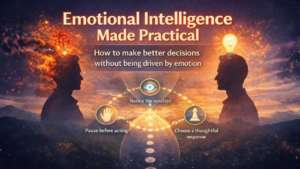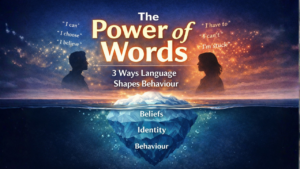Bridging the Gap Between Intention and Action
Have you ever promised yourself you’d make a change—only to fall back into old habits? Whether it’s a New Year’s resolution, a leadership goal, or a personal commitment, most of us have experienced the frustrating gap between what we intend to do and what we actually do.
This disconnect is more than a lack of discipline. It reveals a deeper truth: there’s often a significant gap between our intention vs action, and understanding that gap is the key to lasting transformation.
The Unconscious Behaviour Gap
You may consciously decide to act differently—to listen more deeply, respond with empathy, or change how you engage under pressure. But those conscious choices often clash with deeply ingrained, unconscious behaviours.
According to neuroscience, much of what we do is not governed by deliberate decision-making but by automatic responses shaped by past experiences, beliefs, and emotions. This is what we call the unconscious behaviour gap—the space between your goals and your automatic habits.
In high-stress or emotionally charged moments, your unconscious wins. That’s why genuine, sustainable personal leadership change requires more than surface-level effort—it requires rewiring the patterns below the surface.
Values-Based Action: The Missing Link
To close the gap, we must align our goals with what truly matters—our values. That’s where values-based action comes into play. It’s not just about deciding to change; it’s about acting in ways that reflect your core principles, even when it’s difficult.
In our coaching and communication programs across Australia, we use tools like the Integrated Values Iceberg© to help individuals connect with what drives them at the deepest level. When your unconscious and conscious values align, your behaviour becomes more consistent, authentic, and intentional.
Behaviour Change Strategies That Stick
Most behaviour change is short-lived because it only addresses the external—habits, checklists, routines. But for real change, you need behaviour change strategies that work from the inside out:
Identify unconscious drivers: Use reflective practices and tools to uncover the beliefs and fears driving your default behaviours.
Create conscious rituals aligned with values: Rituals rooted in your personal values are more likely to hold under pressure.
Rehearse for real moments: Prepare for key situations in advance. Practice how you want to show up when it matters most.
Commit to intentional living: Make space daily to realign with your values, check in with your intentions, and reinforce the changes you’re embedding.
Achieving Goals in Australia—and Beyond
Whether you’re a leader, parent, partner, or individual focused on growth, closing the gap between intention vs action is crucial for achieving goals. Across Australia, more people are embracing intentional living as a foundation for leadership, wellbeing, and purpose-driven change.
True transformation doesn’t come from trying harder—it comes from working smarter, aligning your internal world with your external goals, and applying the right tools to change your behaviour at a neurological level.
Final Thought: Align to Transform
You don’t need more motivation—you need alignment. When your unconscious mind, values, and daily actions are in sync, you’ll stop cycling through frustration and start experiencing real change.
It’s time to stop hoping your behaviour will change and start shaping your world through intentional, values-based action.






